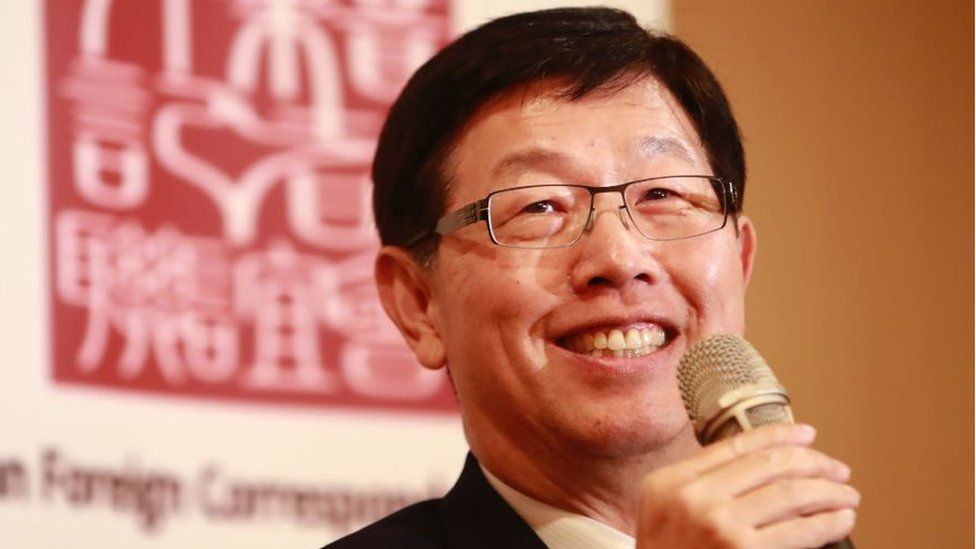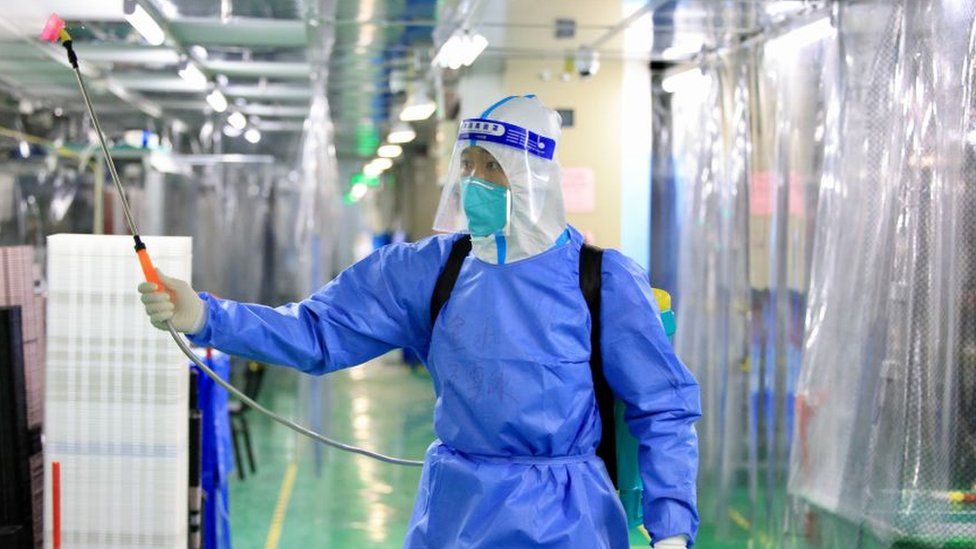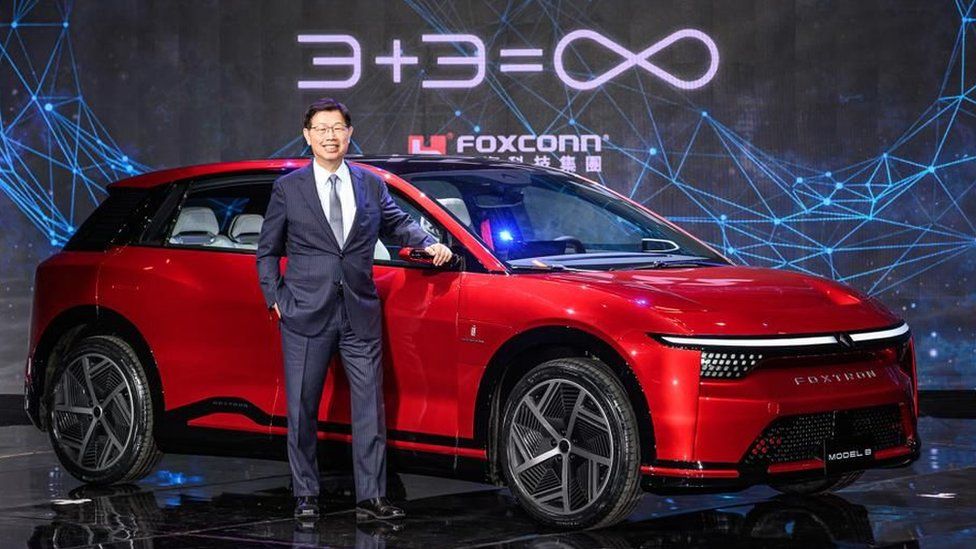iPhone maker Foxconn to switch to cars as US-China tensions soar
-
Published

iPhone maker Foxconn is betting big on electric cars and redrawing some of its supply chains as it navigates a new era of icy Washington-Beijing relations.
In an exclusive interview, chairman and boss Young Liu told the BBC what the future may hold for the Taiwanese firm.
He said even as Foxconn shifts some supply chains away from China, electric vehicles (EVs) are what will drive its growth in the coming decades.
As US-China tensions soar, Mr Liu said, Foxconn must prepare for the worst.
“We hope peace and stability will be something the leaders of these two countries will keep in mind,” 67-year-old Mr Liu told us, in his offices in Taipei, Taiwan’s capital.
“But as a business, as a CEO, I have to think about what if the worst case happens?”
The scenarios could include attempts by Beijing to blockade Taiwan, which it claims as part of China, or worse, to invade the self-ruled island.
Mr Liu said “business continuity planning” was already under way, and pointed out that some production lines, particularly those linked to “national security products” were already being moved from China to Mexico and Vietnam.
He was likely to be referring to servers Foxconn makes that are used in data centres, and can contain sensitive information.
Foxconn, or Hon Hai Technology Group as it is officially known, started off in 1974, making knobs for TVs. Now it is one of the world’s most powerful technology companies, with an annual revenue of $200bn (£158.2bn).
It is best known for making more than half of Apple’s products – from iPhones to iMacs – but it also counts Microsoft, Sony, Dell and Amazon among its clients.
For decades, it has thrived on a playbook perfected by multinational corporations – they design products in the US, manufacture them in China and then sell them to the world. That is how it grew from a small component-making business to the consumer electronics giant it is today.
But as global supply chains adjust to souring ties between Washington and Beijing, Foxconn finds itself in an unenviable spot – caught between the world’s two biggest economies, the very nations that have powered its growth until now.
The US and China are at loggerheads over many things, from trade to the war in Ukraine. But one of the biggest potential flashpoints is Taiwan, where Foxconn is headquartered.
Caught in the middle
Taiwan has been a thorny issue for a long time but Chinese leader Xi Jinping’s repeated pledges of “reunification” have upset the uneasy status quo. Meanwhile, the US, under President Joe Biden, has been more vocal in its support for Taiwan in case of an attack.
Some US voices have crossed China’s red line, calling for independence, although the White House has reaffirmed its position that it maintains diplomatic relations with Beijing and not Taipei.
There are hopes of a thaw with US Secretary of State Antony Blinken visiting China this weekend. But there are also fears of a conflict – one US general has estimated it could happen as soon as the next few years.
“The United States and China are engaged in what we see as strategic competition,” said Shihoko Goto, the deputy director for the Asia programme at the Wilson Center in Washington DC.
“Foxconn wants to do business with both, but there can only be one winner.”
But Mr Liu does not think it is that simple. For one, he said, Foxconn’s business model, which relies on US designs and Chinese manufacturing, is far from over.
“We hire a lot of workers and most countries, including China, want to support their workers,” Mr Liu said, adding that the Chinese government wants companies like Foxconn to keep going because of the huge number of jobs they create.

Are rising tensions putting pressure on the model? “So far? We haven’t seen it,” he told us.
But the West and its allies have called for countries and companies to “de-risk” from China – a long-term shift to curb global reliance on China that is yet to play out.
When asked if that was impacting business, Mr Liu responded cautiously.
Some overseas clients had pushed to move production out of China, he said, but this was their decision to make, not Foxconn’s.
“They get the push from their government about de-risking, and then they will let us know.”
The Covid challenge
Geopolitics aside, Covid-19 is another reason companies might consider “de-risking” from China.
A mix of harsh Covid policies, a lack of space for quarantine and the infectiousness of the Omicron variant led to protests and riots at Foxconn’s factory in Zhengzhou – the world’s biggest iPhone plant – in late 2022. Hundreds of workers, who feared the spread of the virus, fled the campus on foot.
Mr Liu said the scenes that played out for the world to see were caused by a lack of transportation due to Beijing’s unyielding zero-Covid policy.
But when pressed further, he admitted that he should have handled things differently.
“If the same situation occurs again, I would stop production altogether,” he said, reiterating that he would have made that decision even at the risk of irking clients like Apple.
WATCH: Chinese protesters clash with riot police at giant iPhone factory
The company’s success certainly rests on its impressive client base, but Foxconn is just as indispensable to those clients.
To understand how essential it is to Apple, for instance, you just need to look at how much of the iPhone is made by Foxconn – around 60%, by some estimates. The factories in China make some of the most essential parts of the device – camera modules, connectors, even the back of the phone casing.
iPhone on wheels
That expertise is also what Mr Liu is hoping will fuel Foxconn’s next big bet: electric cars.
“Look at this – this is a big iPhone, so we’re very familiar with this,” he said, pointing to a panel that controlled the car he had taken us for a drive in.
Built for families and priced for an aspiring global middle class, the shiny white SUV is one of several models manufactured by Foxconn.
“The reason why we think this is a great opportunity for us is that with the traditional gas engine, you have engines which are mostly mechanical. But with EVs, it’s batteries and motors,” he explains.

That is a familiar language for a technology company like Foxconn, he added.
Foxconn’s hopes to capture about 5% of the global electric vehicle market in the next few years – an ambitious target given the firm has only made a handful of models so far. But it is a gamble that Mr Liu is confident will pay off.
“It doesn’t make sense for you to make [EVs] in one place, so regionalised production for cars is very natural,” he added. Foxconn car factories will be based in Ohio in the US, in Thailand, Indonesia and perhaps even in India, he said.
For now, the company will keep focusing on what it does best – making electronic products for clients. But perhaps not too far in the future, Foxconn will start selling its own cars.
Either way, with the foray into electric cars, Foxconn is diversifying not just production but also supply lines – both of which, Mr Liu believes, hold the key to the company’s future.

Read more about US-China tensions:

